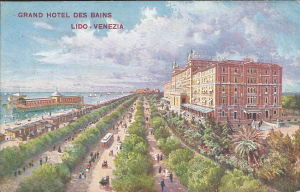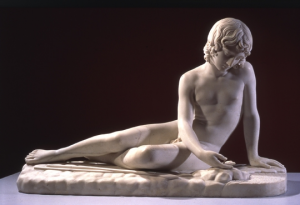An Excerpt from Thomas Mann's 'Death in Venice'

From Death in Venice (Der Tod in Venedig, 1912) by Thomas Mann, translated by Michael Henry Heim (New York: HarperCollins Publishers, 2004).
There is nothing more curious or delicate than a relationship between people who know each other only by sight, who encounter and observe each other daily—nay, hourly—yet are constrained by convention or personal caprice to keep up the pretense of being strangers, indifferent, avoiding a nod or word. There is a feeling of malaise and overwrought curiosity, the hysteria of an unsatisfied, unnaturally stifled need for mutual knowledge and communication, and above all a sort of strained esteem. For a man loves and respects his fellow man only insofar as he is unable to assess him, and longing is a product of insufficient knowledge.
Some kind of relationship and acquaintance was bound to develop between Aschenbach and young Tadzio, and the older man was thrilled to discover that his interest and attention did not go wholly unreciprocated. For example, what induced the beautiful boy, when appearing on the beach each morning, to shun the boardwalk behind the cabanas and saunter through the sand in front of them past Aschenbach’s residence—sometimes coming needlessly close to him, all but grazing his table or chair—on the way to the family cabana? Was this the result of the attraction, the fascination of a superior emotion on a tender and thoughtless object? Aschenbach looked forward daily to Tadzio’s entrance and at times pretended to be busy when it occurred and let the boy pass seemingly unnoticed. But at other times he looked up and their eyes would meet. They were both as grave as could be on such occasions. Nothing in the cultivated and dignified mien of the older man betrayed any agitation, yet there was a query, a pensive question in Tadzio’s eyes, a hesitation in his gait, and he looked down, then sweetly up again, and when he had passed, something in his bearing intimated that only good breeding kept him from looking back.
Once, however, one evening, something different happened. The Polish boy and his sisters together with their governess had failed to come to dinner in the main dining room, as Aschenbach noted with alarm. After the meal, worried about their absence, he was pacing in evening dress and a straw hat in front of the hotel at the foot of the terrace when all at once he spied the nunlike sisters with their companion and, four steps behind them, Tadzio, emerging into the light of the arc lamps. They were obviously on their way from the vaporetto landing, having dined in the city for some reason. It must have been cool on the water: Tadzio was wearing a navy blue pea jacket with gold buttons and a matching cap. Sunshine and sea air did not tan him, and his skin had the same yellowish marble hue as at the outset, but today he looked paler than usual, whether because of the cool air or the bleaching effect of the lamps’ lunar light. His symmetrical eyebrows stood out more sharply; his eyes were a deep, dark shade. He was more beautiful than words can convey, and Aschenbach felt acutely, as he had often felt before, that language can only praise physical beauty, not reproduce it.
He was unprepared for the precious apparition: it had come unexpectedly, and he had not had time to put on a calm, dignified expression. Joy, surprise, and admiration may thus have shown openly in his face when his eyes met those of the boy who had disappeared, and at that instant it happened: Tadzio smiled, smiled at him, with an effusive, intimate, charming, unabashed smile, his lips opening slowly. It was the smile of Narcissus bending over the water mirror, the deep, enchanted, protracted smile with which he stretched out his arms to the reflection of his own beauty, an ever so slightly contorted smile—contorted by the hopelessness of his endeavor to kiss the lovely lips of his shadow—and coquettish, inquisitive and mildly pained, beguiled and beguiling.
The recipient of this smile hurried off with it as if it were a fatal gift. He was so shaken that he felt compelled to flee the light of the terrace and front garden and hastily sought the obscurity of the rear grounds. Oddly indignant and tender admonitions welled up inside him: “You mustn’t smile like that! One mustn’t smile like that at anyone, do you hear?” He flung himself on a bench, frantically inhaling the plants’ nocturnal fragrance. Then, leaning back, arms dangling, overwhelmed and shuddering repeatedly, he whispered the standard formula of longing—impossible here, absurd, perverse, ridiculous and sacred nonetheless, yes, still venerable even here: “I love you!”
